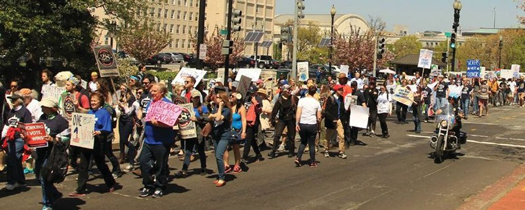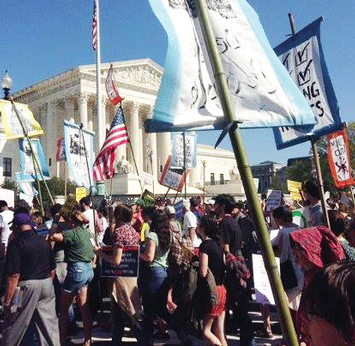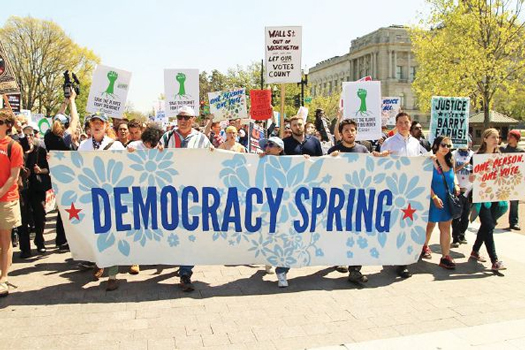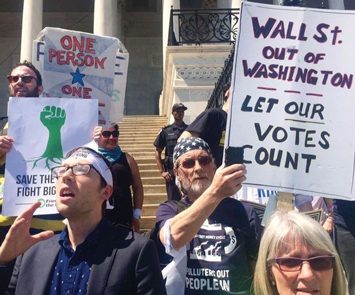Democracy Awakening Says Voters Must Count More Than Big Money
By Askia Muhammad and Nisa Islam Muhammad -Final Call Staffers- | Last updated: Apr 20, 2016 - 7:58:03 PMWhat's your opinion on this article?

|
WASHINGTON—Nearly 1,000 protesters were arrested at the U.S. Capitol in wave after wave of acts of civil disobedience April 11-18, dubbed “Democracy Spring.” The protests were designed to “take back American democracy” from the various “big money” interests which traditionally rule politics.
Those arrested were charged with violating a D.C. statute prohibiting “crowding” which is a misdemeanor, according to police. Most were processed and released on the scene.
“This week, we’re taking back our democracy,” actress Rosario Dawson told the rally April 14 according to published reports. Money in politics has “distorted our politics and our issues.” Police arrested the actress one day later.
“I just wanted to say that if you are risking arrest, it’s incredibly important for you to remember that it’s a privilege to be able to do that as a statement,” April Goggins, an organizer with Black Lives Matter D.C. told the rally. “Every day in this country, mass incarceration is like a last name for so many people.

|
The Democracy Spring effort started in Philadelphia, where thousands began a 140-mile walk to the U.S. Capitol to “demand Congress take immediate action to end the corruption of big money in our politics and ensure free and fair elections in which every American has an equal voice.” Peaceful sit-ins were planned and thousands of people pledged to risk arrest, the group said on its website.
Despite virtually no corporate media exposure, the protest started with a bang. More than 400 were arrested after engaging in acts of civil disobedience. The next day another 100 were arrested. The following day 85 elderly protesters were arrested, but the activities were barely noticed on corporate-owned television news programs. According to a tally by The Intercept, CNN did not devote any coverage to the protests, MSNBC mentioned them for 12 seconds, and Fox News discussed them for 17 seconds. CNN later posted a short item online.
Democracy Spring’s march from Philadelphia to Washington involved people from 33 states. On April 15, 12 protesters handcuffed themselves to scaffolding inside the Capitol rotunda and were arrested. They said in unison: “We the people demand a democracy free from the corruption influence of big money and voter suppression. We demand a democracy where every vote is counted and every voice is heard.”

Thousands marched through the streets of Washington, D.C. to get big money out of politics and ensure the right to vote. Photos: Democracy Spring/Facebook
|
The demonstration on Racial Justice Day emphasized how big money in elections and restrictive voting laws thwart racial justice. Supporters demanded that “Congress restore the protections of the Voting Rights Act, and make it easier for regular people to run for office by limiting big money and empowering small donors, and hold a hearing and a vote on a Supreme Court nominee that shares these values,” they said in a statement.
Other speakers that day included: Stuart Anderson, Family & Friends of Incarcerated People; Anise Jenkins, Stand Up! For Democracy in D.C.; Schyla Pondexter-Moore EMPOWER DC; and Malik Farrakhan, Cease Fire, Don’t Smoke the Brothers and Sisters.

|
“Meanwhile, the Brennan Center for Justice found that of the 11 states with the highest African American turnout in 2008, seven passed laws making it harder to vote,” said Mr. Creighton.
“We’re here to say that we want to get big money out of politics by passing laws that encourage small donor participation and put limits on big donors,” Kai Newkirk, a lead organizer of Democracy Spring said at a rally. “And we want to make it easier, not harder, for ordinary people to vote and participate in our democracy. We also believe that the American people deserve a new Supreme Court justice who shares these values professed by the vast majority of the American public,” she said.
In addition to devoting a day to look at racial justice, Democracy Spring observed a “Labor Solidarity Day,” “Youth and Student Day,” and “Climate Justice Day.” Organizers concluded the week long demonstrations with weekend protests which were dubbed “Democracy Awakening,” which echoed the calls for democracy reforms with additional teach-ins, rallies, and civil disobedience.
Public Citizen and the NAACP are two of the groups which led the effort, but national and local groups were involved. Supporters wanted to consider that Democracy Spring may be remembered as one of the largest and most persistent peaceful protests at the U.S. Capitol. Democracy Spring is calling on Congress to enact solutions to strengthen U.S. democracy so the power of one’s voice is not determined by the size of one’s wallet and so that the government works for every American.
“Fifty years after the signing of the Voting Rights Act, we have seen the Supreme Court nullify its preclearance protections while congressional leadership has refused to fix it for more than two years,” said the Rev. Dr. William J. Barber II, pastor and Moral Monday architect.
“This is immoral, an attack on our democracy, and a threat to the furtherance of every other progressive ideal—we cannot stand quietly by. We must now stand up all over the country and reawaken the spirit of true democracy.”
More than 300 organizations, a broad coalition representing labor, peace, environmental, student, racial justice, civil rights and money in politics reform movements came to protest. Mobilizers came by bus, air, van and car, including Michigan, Kentucky, Florida, Connecticut, Tennessee and California.
“The right to vote is the closest thing we have to a civic sacrament. It is enshrined in our temple of democracy. Yet we are going into the first presidential election in 50 years without the full protection of the Voting Rights Act. When more than 33 states pass new laws requiring a photo ID to vote, but cut back and shut down the government offices where voters can obtain the required cards, the need to act is clear,” said Cornell William Brooks, president and CEO of the NAACP.
“This is a profound challenge and assault on our democracy. That is why we are here today. An NAACP member by the name of the Rev. James Edmund Prioleau, my grandfather, stood for the right to vote 70 years ago. I stand in his name—and his legacy stands with us.”
After the rally, the demonstrators marched around the Capitol, past the Supreme Court and ended at Columbus Circle for a faith vigil. Religious leaders told the story of “The Golden Calf” and explained how idolatry of money in the United States today is stifling democracy and highlights why money must be out of politics.
“This is a movement moment. Americans feel enormous frustration towards a system where voters have to stand in lines for hours, where every day Americans can’t be heard over the roar of big money, and where some members of Congress are trying to prevent our courts from functioning. Congress has solutions in front of them, and we’re going to keep making noise until our elected leaders take action to create a democracy that works for all of us,” said Marge Baker, executive vice president of People For the American Way.
Harry Anderson and Beverly Robinson traveled from Baltimore to attend a rally. “I’m just sick and tired of all the big money politics that ignore the needs of the common people. What happened to ‘we the people?’ It looks more like ‘we the people with the big bucks.’ Money is the biggest voice in the election and the people who need to be represented the most are getting the least out of what’s going on,” Mr. Anderson told The Final Call.
For Ms. Robinson the most important thing about being at the rally was connecting with like-minded people. “I met so many people who think like we do. Who want the same things we do. We want the country ruled by the people who vote politicians into office not by the big money that controls so much in America. Things have to change and if we don’t do something about it nothing will get done and things will only get worse,” she told The Final Call.
Key speakers over the weekend included Dolores Huerta, civil rights leader; Kathleen Turner, award-winning actress and advocate; Ellen Weintraub, Federal Election Commission Commissioner; Wenonah Hauter, executive director of Food & Water Watch and other leaders and activists from across the country.
“The AFL-CIO is proud to be part of this Democracy Awakening. The unions of the AFL-CIO are committed to broadening our democracy—to having the voices and votes of working people heard. That’s why we will continue to fight the corrupting influence of corporate cash,” said Tefere Gebre, executive vice president of the AFL-CIO.
INSIDE STORIES AND REVIEWS
-
-
About Harriett ... and the Negro Hollywood Road Show
By Rabiah Muhammad, Guest Columnist » Full Story -
Skepticism greets Jay-Z, NFL talk of inspiring change
By Bryan 18X Crawford and Richard B. Muhammad The Final Call Newspaper @TheFinalCall » Full Story -
The painful problem of Black girls and suicide
By Charlene Muhammad -National Correspondent- » Full Story -
Exploitation of Innocence - Report: Perceptions, policies hurting Black girls
By Charlene Muhammad -National Correspondent- » Full Story -
Big Ballin: Big ideas fuel a father’s Big Baller Brand and brash business sense
By Bryan Crawford -Contributing Writer- » Full Story






 Click Here Stay Connected!
Click Here Stay Connected!








